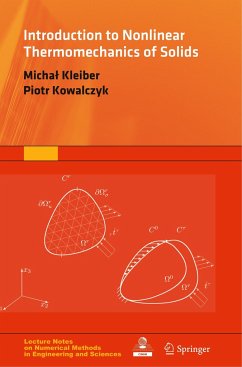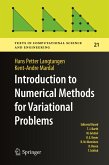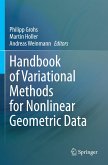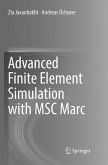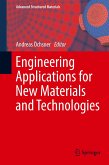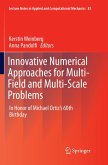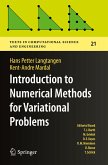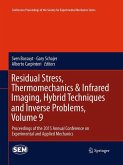- Broschiertes Buch
- Merkliste
- Auf die Merkliste
- Bewerten Bewerten
- Teilen
- Produkt teilen
- Produkterinnerung
- Produkterinnerung
The first part of this textbook presents the mathematical background needed to precisely describe the basic problem of continuum thermomechanics. The book then concentrates on developing governing equations for the problem dealing in turn with the kinematics of material continuum, description of the state of stress, discussion of the fundamental conservation laws of underlying physics, formulation of initial-boundary value problems and presenting weak (variational) formulations. In the final part the crucial issue of developing techniques for solving specific problems of thermomechanics is…mehr
Andere Kunden interessierten sich auch für
![Introduction to Numerical Methods for Variational Problems Introduction to Numerical Methods for Variational Problems]() Hans Petter LangtangenIntroduction to Numerical Methods for Variational Problems55,99 €
Hans Petter LangtangenIntroduction to Numerical Methods for Variational Problems55,99 €![Handbook of Variational Methods for Nonlinear Geometric Data Handbook of Variational Methods for Nonlinear Geometric Data]() Handbook of Variational Methods for Nonlinear Geometric Data147,99 €
Handbook of Variational Methods for Nonlinear Geometric Data147,99 €![Advanced Finite Element Simulation with MSC Marc Advanced Finite Element Simulation with MSC Marc]() Zia JavanbakhtAdvanced Finite Element Simulation with MSC Marc74,99 €
Zia JavanbakhtAdvanced Finite Element Simulation with MSC Marc74,99 €![Engineering Applications for New Materials and Technologies Engineering Applications for New Materials and Technologies]() Engineering Applications for New Materials and Technologies119,99 €
Engineering Applications for New Materials and Technologies119,99 €![Innovative Numerical Approaches for Multi-Field and Multi-Scale Problems Innovative Numerical Approaches for Multi-Field and Multi-Scale Problems]() Innovative Numerical Approaches for Multi-Field and Multi-Scale Problems110,99 €
Innovative Numerical Approaches for Multi-Field and Multi-Scale Problems110,99 €![Introduction to Numerical Methods for Variational Problems Introduction to Numerical Methods for Variational Problems]() Hans Petter LangtangenIntroduction to Numerical Methods for Variational Problems38,99 €
Hans Petter LangtangenIntroduction to Numerical Methods for Variational Problems38,99 €![Residual Stress, Thermomechanics & Infrared Imaging, Hybrid Techniques and Inverse Problems, Volume 9 Residual Stress, Thermomechanics & Infrared Imaging, Hybrid Techniques and Inverse Problems, Volume 9]() Residual Stress, Thermomechanics & Infrared Imaging, Hybrid Techniques and Inverse Problems, Volume 9147,99 €
Residual Stress, Thermomechanics & Infrared Imaging, Hybrid Techniques and Inverse Problems, Volume 9147,99 €-
-
-
The first part of this textbook presents the mathematical background needed to precisely describe the basic problem of continuum thermomechanics. The book then concentrates on developing governing equations for the problem dealing in turn with the kinematics of material continuum, description of the state of stress, discussion of the fundamental conservation laws of underlying physics, formulation of initial-boundary value problems and presenting weak (variational) formulations. In the final part the crucial issue of developing techniques for solving specific problems of thermomechanics is addressed. To this aim the authors present a discretized formulation of the governing equations, discuss the fundamentals of the finite element method and develop some basic algorithms for solving algebraic and ordinary differential equations typical of problems on hand. Theoretical derivations are followed by carefully prepared computational exercises and solutions.
Produktdetails
- Produktdetails
- Lecture Notes on Numerical Methods in Engineering and Sciences
- Verlag: Springer / Springer International Publishing / Springer, Berlin
- Artikelnr. des Verlages: 978-3-319-81517-6
- Softcover reprint of the original 1st ed. 2016
- Seitenzahl: 356
- Erscheinungstermin: 31. Mai 2018
- Englisch
- Abmessung: 235mm x 155mm x 20mm
- Gewicht: 566g
- ISBN-13: 9783319815176
- ISBN-10: 3319815172
- Artikelnr.: 53580079
- Lecture Notes on Numerical Methods in Engineering and Sciences
- Verlag: Springer / Springer International Publishing / Springer, Berlin
- Artikelnr. des Verlages: 978-3-319-81517-6
- Softcover reprint of the original 1st ed. 2016
- Seitenzahl: 356
- Erscheinungstermin: 31. Mai 2018
- Englisch
- Abmessung: 235mm x 155mm x 20mm
- Gewicht: 566g
- ISBN-13: 9783319815176
- ISBN-10: 3319815172
- Artikelnr.: 53580079
Prof. Michal Kleiber lectured for many years at the Mathematics and Information Science Department of the Warsaw University of Technology. His educational background is thermo-mechanics of solids (M.Sc. in engineering from the Warsaw University of Technology) and applied math and information science (M.Sc. in mathematics from the University of Warsaw). He has done research on modelling and large scale computer simulations in solid and fluid thermo-mechanics, material science, bioengineering and system reliability as well as on numerical methods and software engineering. He has published over 240 articles in leading international journals and authored several world-wide distributed books. He spent over 10 years teaching and doing research at different universities in Stuttgart, Bochum, Hannover and Darmstadt in Germany, Berkeley, CA in the USA and Tokyo in Japan. He has also given lecture courses at many other universities in the USA, Europe, Africa and Asia. Professor Kleiber is an elected member of the Academies of Sciences in Poland and Austria, and has honorary doctor degrees from a number of universities in Poland, Germany and Belgium. He is a member of editorial boards of 15 international research journals and the editor-in-chief of two of them.In 2001 he received the Foundation for Polish Science Award which is the most prestigious award for research achievements in Poland. Professor Kleiber is currently the president of the European Materials Forum and a member of the Executive Council of the International Association of Computational Mechanics; in 1999-2001 he was a member of the Board of Governors for the EU Joint Research Centre. Professor Kleiber was for some time on leave of absence from his academic duties serving as the Minister of Science and Information Society Technologies in the Polish government. He currently serves as a pro bono scientific adviser to the President of Poland.Piotr Kowalczyk graduated from Warsaw University of Technology and then received his PhD from the Institute of Fundamental Technological Research (IPPT PAN) in Warsaw in 1993. Currently he is an associate professor at IPPT PAN. In his research he is dealing with computational mechanics with particular applications to biomechanics, plasticity, composite materials, sensitivity analysis and optimization. Since 2003 he has lectured graduate students of informatics on nonlinear computational thermomechanics of solids.
1. Introduction.- 1.1. General remarks on the book content.- 1.2. Nonlinear continuum thermomechanics as a field of research and its industrial applications.- 2. Fundamental concepts of mechanics.- 2.1. Statics of a bar.- 2.2. Trusses.- 2.3. Two-dimensional continuum generalization.- 3. Fundamentals of tensor algebra and analysis.- 3.1. Introduction.- 3.1.1. Euclidean space and coordinate systems.- 3.1.2. Scalars and vectors.- 3.1.3. Basis of vector space.- 3.2. Tensors.- 3.2.1. Definitions.- 3.2.2. Operations on tensors.- 3.2.3. Isotropic tensors.- 3.3. Second order tensors.- 3.3.1. Definitions and properties.- 3.3.2. Tensor eigenproblem.- 3.3.3. Spectral decomposition of symmetric tensor.- 3.3.4. Polar decomposition of tensor.- 3.4. Tensor functions and fields.- 3.4.1. Integration and differentiation of tensor fields.- 3.4.2. Gauss-Ostrogradski theorem.- 3.5. Curvilinear coordinate systems.- 3.6. Notations used in tensor description.- 4. Motion, deformation and strain in materialcontinuum.- 4.1. Motion of bodies.- 4.2. Strain.- 4.2.1. Definitions.- 4.2.2. Physical meaning of strain in one dimension.- 4.2.3. Physical meaning of strain components.- 4.2.4. Some other strain tensor properties.- 4.3. Area and volumetric deformation.- 4.4. Strain rate and strain increments.- 4.4.1. Time derivative of a tensor field. Lagrangian and Eulerian description of motion.- 4.4.2. Increments and rates of strain tensor measures.- 4.4.3. Strain increments and rates in one dimension.- 4.5. Strain compatibility equations.- 5. Description of stress state.- 5.1. Introduction.- 5.1.1. Forces, stress vectors and stress tensor in continuum.- 5.1.2. Principal stress directions. Extreme stress values.- 5.2. Description of stress in deformable body.- 5.2.1. Cauchy and Piola-Kirchhoff stress tensors.- 5.2.2. Objectivity and invariance of stress measures.- 5.3. Increments and rates of stress tensors.- 5.4. Work of internal forces. Conjugate stress-strain pairs.- 6. Conservation laws in continuum mechanics.- 6.1. Mass conservation law.- 6.2. Momentum conservation law.- 6.3. Angular momentum conservation law.- 6.4. Mechanical energy conservation law.- 7. Constitutive equations.- 7.1. Introductory remarks.- 7.2. Elastic materials.- 7.2.1. Linear elasticity.- 7.2.2. Nonlinear elasticity.- 7.3. Viscoelastic materials.- 7.3.1. One-dimensional models.- 7.3.2. Continuum formulation.- 7.3.3. Energy dissipation in viscoelastic materials.- 7.4. Elastoplastic materials.- 7.4.1. One-dimensional models.- 7.4.2. Three-dimensional formulation in plastic flow theory.- 8. Fundamental system of solid mechanics equations.- 8.1. Field equations and initial-boundary conditions.- 8.2. Incremental form of equations.- 8.3. Some special cases.- 8.4. Example of analytical solution.- 9. Fundamentals of thermomechanics and heat conduction problem.- 9.1. Laws of thermodynamics.- 9.1.1. The first law of thermodynamics.- 9.1.2. The second law of thermodynamics.- 9.2. Heat conduction problem.- 9.3. Fundamental system of solid thermomechanics equations. Thermomechanical Couplings.- 9.4. Thermal expansion in constitutive equations of linear elasticity.- 10. Variational formulations in solid thermomechanics.- 10.1. Variational principles - introduction.- 10.2. Variational formulations for linear mechanics problems.- 10.2.1. Virtual work principle and potential energy.- 10.2.2. Extended variational formulations.- 10.3. Variational formulations for nonlinear mechanics problems.- 10.3.1. Elasticity at large deformations.- 10.3.2. Incremental problem of nonlinear mechanics.- 10.4. Variational formulations for heat conduction problems.- 11. Discrete formulations in thermomechanics.- 11.1. Discrete formulations in heat conduction problems.- 11.1.1. Linear problem of stationary heat conduction.- 11.1.2. General form of the heat conduction problem.- 11.2. Discrete formulations in solid mechanics problems.- 11.2.1. Linear problem of statics.- 11.2.2. Linear problem of dynamics.- 11.2.3. Nonlinear elastic problem with large deformations.- 11.2.4. Incremental form of nonlinear mechanics problem.- 11.3. Weighted residual method.- 12. Fundamentals of finite element method.- 12.1. Introduction.- 12.1.1. FEM formulation for linear heat conduction problem.- 12.1.2. FEM formulation for linear static elasticity problem.- 12.2. FEM approximation at the element level.- 12.2.1. Simple one-dimensional elements.- 12.2.2. Constant strain elements.- 12.2.3. Isoparametric elements.- 13. Solution of FEM equation systems.- 13.1. Introduction.- 13.2. Solution methods for linear algebraic equation systems.- 13.2.1. Elimination methods.- 13.2.2. Iterative methods.- 13.3. Multigrid methods.- 13.4. Solution methods for nonlinear algebraic equation systems.- 13.5. Solution methods for linear and nonlinear systems of first order ordinary differential equations.- 13.6. Solution methods for linear and nonlinear systems of second order ordinary differential equations.- Bibliography.- Index.
1. Introduction.- 1.1. General remarks on the book content.- 1.2. Nonlinear continuum thermomechanics as a field of research and its industrial applications.- 2. Fundamental concepts of mechanics.- 2.1. Statics of a bar.- 2.2. Trusses.- 2.3. Two-dimensional continuum generalization.- 3. Fundamentals of tensor algebra and analysis.- 3.1. Introduction.- 3.1.1. Euclidean space and coordinate systems.- 3.1.2. Scalars and vectors.- 3.1.3. Basis of vector space.- 3.2. Tensors.- 3.2.1. Definitions.- 3.2.2. Operations on tensors.- 3.2.3. Isotropic tensors.- 3.3. Second order tensors.- 3.3.1. Definitions and properties.- 3.3.2. Tensor eigenproblem.- 3.3.3. Spectral decomposition of symmetric tensor.- 3.3.4. Polar decomposition of tensor.- 3.4. Tensor functions and fields.- 3.4.1. Integration and differentiation of tensor fields.- 3.4.2. Gauss-Ostrogradski theorem.- 3.5. Curvilinear coordinate systems.- 3.6. Notations used in tensor description.- 4. Motion, deformation and strain in materialcontinuum.- 4.1. Motion of bodies.- 4.2. Strain.- 4.2.1. Definitions.- 4.2.2. Physical meaning of strain in one dimension.- 4.2.3. Physical meaning of strain components.- 4.2.4. Some other strain tensor properties.- 4.3. Area and volumetric deformation.- 4.4. Strain rate and strain increments.- 4.4.1. Time derivative of a tensor field. Lagrangian and Eulerian description of motion.- 4.4.2. Increments and rates of strain tensor measures.- 4.4.3. Strain increments and rates in one dimension.- 4.5. Strain compatibility equations.- 5. Description of stress state.- 5.1. Introduction.- 5.1.1. Forces, stress vectors and stress tensor in continuum.- 5.1.2. Principal stress directions. Extreme stress values.- 5.2. Description of stress in deformable body.- 5.2.1. Cauchy and Piola-Kirchhoff stress tensors.- 5.2.2. Objectivity and invariance of stress measures.- 5.3. Increments and rates of stress tensors.- 5.4. Work of internal forces. Conjugate stress-strain pairs.- 6. Conservation laws in continuum mechanics.- 6.1. Mass conservation law.- 6.2. Momentum conservation law.- 6.3. Angular momentum conservation law.- 6.4. Mechanical energy conservation law.- 7. Constitutive equations.- 7.1. Introductory remarks.- 7.2. Elastic materials.- 7.2.1. Linear elasticity.- 7.2.2. Nonlinear elasticity.- 7.3. Viscoelastic materials.- 7.3.1. One-dimensional models.- 7.3.2. Continuum formulation.- 7.3.3. Energy dissipation in viscoelastic materials.- 7.4. Elastoplastic materials.- 7.4.1. One-dimensional models.- 7.4.2. Three-dimensional formulation in plastic flow theory.- 8. Fundamental system of solid mechanics equations.- 8.1. Field equations and initial-boundary conditions.- 8.2. Incremental form of equations.- 8.3. Some special cases.- 8.4. Example of analytical solution.- 9. Fundamentals of thermomechanics and heat conduction problem.- 9.1. Laws of thermodynamics.- 9.1.1. The first law of thermodynamics.- 9.1.2. The second law of thermodynamics.- 9.2. Heat conduction problem.- 9.3. Fundamental system of solid thermomechanics equations. Thermomechanical Couplings.- 9.4. Thermal expansion in constitutive equations of linear elasticity.- 10. Variational formulations in solid thermomechanics.- 10.1. Variational principles - introduction.- 10.2. Variational formulations for linear mechanics problems.- 10.2.1. Virtual work principle and potential energy.- 10.2.2. Extended variational formulations.- 10.3. Variational formulations for nonlinear mechanics problems.- 10.3.1. Elasticity at large deformations.- 10.3.2. Incremental problem of nonlinear mechanics.- 10.4. Variational formulations for heat conduction problems.- 11. Discrete formulations in thermomechanics.- 11.1. Discrete formulations in heat conduction problems.- 11.1.1. Linear problem of stationary heat conduction.- 11.1.2. General form of the heat conduction problem.- 11.2. Discrete formulations in solid mechanics problems.- 11.2.1. Linear problem of statics.- 11.2.2. Linear problem of dynamics.- 11.2.3. Nonlinear elastic problem with large deformations.- 11.2.4. Incremental form of nonlinear mechanics problem.- 11.3. Weighted residual method.- 12. Fundamentals of finite element method.- 12.1. Introduction.- 12.1.1. FEM formulation for linear heat conduction problem.- 12.1.2. FEM formulation for linear static elasticity problem.- 12.2. FEM approximation at the element level.- 12.2.1. Simple one-dimensional elements.- 12.2.2. Constant strain elements.- 12.2.3. Isoparametric elements.- 13. Solution of FEM equation systems.- 13.1. Introduction.- 13.2. Solution methods for linear algebraic equation systems.- 13.2.1. Elimination methods.- 13.2.2. Iterative methods.- 13.3. Multigrid methods.- 13.4. Solution methods for nonlinear algebraic equation systems.- 13.5. Solution methods for linear and nonlinear systems of first order ordinary differential equations.- 13.6. Solution methods for linear and nonlinear systems of second order ordinary differential equations.- Bibliography.- Index.
"This book introduces thermomechanics mathematically. ... The book is a good introduction for beginners who want to do research in solid mechanics and/or thermomechanics. It can be used as a textbook for courses involving solid mechanics/thermomechanics. For computer professionals dealing with engineering problems, this is a good introduction." (Maulik A. Dave, Computing Reviews, computingreviews.com, October, 2016)

